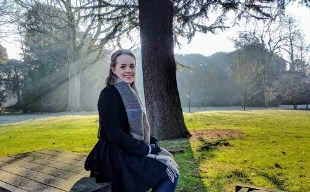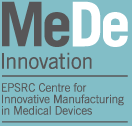Growth stories: Katie Timms

March 31, 2017
In 2016, MeDe Innovation funded 7 PhD students to undertake a secondment within the scope of our research. Our ‘Growth stories’ series gives an overview of their expereinces, and highlights how our funding is helping to develop their careers
Secondment: Research in Government and Parliament – Katie Timms
Why undertake a secondment?
I have always been interested in science and research, but was curious about the alternative careers available following my PhD. In particular, I wanted to learn more about how science or research are understood by government and parliament, and how we as researchers could improve these relationships. Academic research is highly technical and can contain a large amount of jargon. Politicians or civil servants often don’t have a background in such technical subjects, yet it is vital for research impact that they understand outcomes of research.
At the same time I was considering this, MeDe Innovation had just put out a call for funding for early career researcher secondments. On a PhD student’s stipend there is not a lot of scope for spending time at different organisations and exploring outside of the research project itself. So, I decided to apply for the MeDe funding to gain a better understanding of how government and parliament interpret and utilise scientific evidence, and vice versa. I put in my application, describing what I wanted to achieve from the placement, and was lucky enough to be awarded the funding for spending two weeks in London.
Through contacts within the Institute of Biological and Medical Engineering, MeDe Innovation, and the staff development unit at the University of Leeds, I contacted a number of organisations and government departments enquiring about spending time there. I was fortunate enough to organise time at both the Royal Academy of Engineering and the House of Commons Library.
Royal Academy of Engineering
The Royal Academy of Engineering represents engineers in academia and industry in the UK. It aims to guide the engineering profession and advises the government on key issues related to engineering
“As the UK’s national academy for engineering, we bring together the most successful and talented engineers from across the engineering sectors for a shared purpose: to advance and promote excellence in engineering.” Royal Academy of Engineering website
It does this in a multitude of ways, including public engagement, communication through social media, funding fellowships and various other schemes, connecting with industry through their enterprise hub, and, importantly for me, by influencing policy.
Policies are non-technical, clear statements outlining how an organisation can meet specific aims. The government has policy across a huge variety of areas, but the Royal Academy of Engineering get involved when it could influence, or be influenced by any aspect engineering. This can either be reactive: for instance contributing to select committees, or in advising industrial strategy, or proactive: identifying a key area which needs the government should further develop policy
The Academy uses its expert fellows to gather evidence for these reports and policy documents. When a subject is evaluated by the Academy, policy advisors first write a ‘straw man’ (a document which they know is going to be heavily amended), that they can send to relevant fellows in the field. The fellows can then contribute.
Further, the Academy also holds meetings to discuss ideas. For example, Biomedical Special Interest Group with academics in the field, and education meetings where professional accrediting institutions are represented and have their say.
Overall, to be represented in policy at the Royal Academy of Engineering it is useful to have links with relevant experts in the field, or have your say through accrediting institutions.
House of Commons Library
As opposed to working with the government to inform policy, the House of Commons Library with closely with members of parliament. They have a physical library within Westminster Palace, which loans books to MPs. Of interest to me were the library’s technical experts – these clerks have three main aspects to their jobs (see below).
During the week I worked with the library’s medical expert, and was able to contribute to a couple of constituent inquiries as well as a research briefing. Constituent inquiries can range from ‘my neighbour is building an extension, what can I do’ to ‘I have heard about this new treatment in the news, what are its benefits and drawbacks’ and ‘Why are the government imposing a sugar tax?’. This means the work is highly varied and interesting!
Since the library only subscribes to a limited selection of academic journals, it has to use information from other sources. Two common sources of information are the Hansard (a report all proceedings in the House of Commons or Lords) and the media (news websites or newspaper archives). Academic researchers could have a role to play here. Discussions and communication about the importance of research topics with both MPs and mainstream media can increase the impact of research and facilitate this researcher-parliament relationship.
Furthermore, I also had the opportunity to sit in on a science and technology select committee. Select committees are made up of MPs, who scrutinise government on specific topics. Once the committee decides on relevant topics, they open calls for written evidence. Academics and researchers can influence the topics under scrutiny, and respond to calls for evidence. Committee members appreciate input from academics since they often have limited time and resources to search the literature, so being sent information helps speed up this process!
How can researchers engage with parliament and government?
Both organisations I spent time with evaluate and bring together scientific evidence to produce documents using non-technical language. As experts in our fields, if we can present our research in an accessible manner this could improve its impact and facilitate its use by policy-makers and beyond. Further, interactions via professional institutions, members of parliament, and collaboration with other technical experts can help increase the influence of research and thus make it more likely to be heard.
I would like to thank MeDe Innovation for funding my secondment, everybody at the University of Leeds and beyond who helped me find appropriate contacts for my secondment, and those at the Royal Academy of Engineering (especially Philippa) and the House of Commons Library (Sarah and Ed in particular) for making my two weeks so enjoyable and keeping me occupied! I have also written an article for the University of Leeds Careers Centre.
